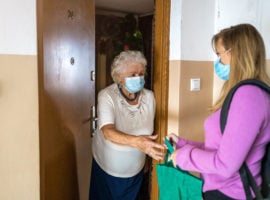Elijah’s Promise is not your usual emergency food provider. Located in New Brunswick, NJ, this multi-faceted organization is using food as a tool for change. It houses a community soup kitchen, culinary arts school, catering company, small business incubator and a pay-what-you-can café. Forward-thinking, Elijah’s Promise exemplifies how food can be used in many ways to change the lives of the people that walk through its doors, whether through serving a healthy meal, teaching people how to cook or supporting small food businesses.
Elijah’s Promise wasn’t always the leader in good food that it is today. That path started some 20 years ago when in a single day, two events sparked the staff to rethink the way they did things. A mother came into Executive Director Lisanne Finston’s office after having received her pantry bag from the neighboring food pantry (a separate organization). She placed the bag on Lisanne’s desk and proceeded, item by item, to explain why she couldn’t give any of the not-so-healthy food to her young, diabetic son. Later that day, a group of volunteers– often outside groups who purchase and prepare the meals– were making lunch for the soup kitchen when Lisanne saw the group dump a large jar of Cheez Whiz into a tuna casserole. The staff decided that things needed to change. At a panel discussion that Lisanne sat on, she announced to the room that Elijah’s Promise was going to serve healthy food to their clients. The entire room erupted in laughter at an idea that nowadays is very commonplace.
Their next step was to talk with their clients through a series of focus groups. The staff learned that many clients had chronic health issues, couldn’t eat some of the food being served and wanted healthier options. Today, the soup kitchen often has three or four fruit or vegetable dishes available at each meal. They serve only water now instead of offering juices. (Over the years, they have seen the transformation of fruit juices from 100% juice to sugary, additive-laden drinks that only contain 10% fruit juice.) Based on feedback from the focus groups, the soup kitchen serves dessert twice a week because their clients believe in everything in moderation.
The new challenge of sourcing healthier food actually turned into several new opportunities for Elijah’s Promise. Reducing the amount of unhealthy food they served, which was often physically heavy and more expensive to transport, freed up funds and created more fridge and freezer space to store the fresh produce they were beginning to acquire through new relationships with local farmers. The newfound storage space allowed them to process the produce for longer use. Their farm to freezer produce is now used by all aspects of the organization: the soup kitchen, the catering company, cooking school and the pay-what-you-can café.
In a separate building lies the economic and entrepreneurial home of Elijah’s Promise: their culinary arts school, catering company and incubation space. Their cooking school trains students in the culinary and pastry arts, and the catering company creates food for Meals on Wheels and other community organizations and events. Their newest focus is incubating culinary students’ small businesses and creating value added products, like homemade cranberry chutney for Thanksgiving, to sell at farmer’s markets. Through these economic development projects, Elijah’s Promise generates 25% of its own revenue.
Elijah’s Promise is also working towards building a better food system in New Jersey and committed to advocating for policies that promote food security and nutrition for all people. In partnership with the City of New Brunswick and the New Brunswick Methodist Church, they coordinate and manage four community gardens across the city. They run a community supported agriculture program with a local organic farmer who offers sliding scale and variable payment plan options. Elijah’s Promise is also a part of the New Brunswick Community Food Alliance: a coalition of college students, city residents, community leaders and local government officials working together to build a sustainable and just food system in New Brunswick.
As we visit more innovative emergency food providers, some key patterns are emerging that influence change: visionary leadership; creating your vision with your clients, not for them; promoting good food for all; and seeing opportunity in challenges and investing in your local economy. Elijah’s Promise is a great example of how change can happen if there is the right blend of these key elements.





